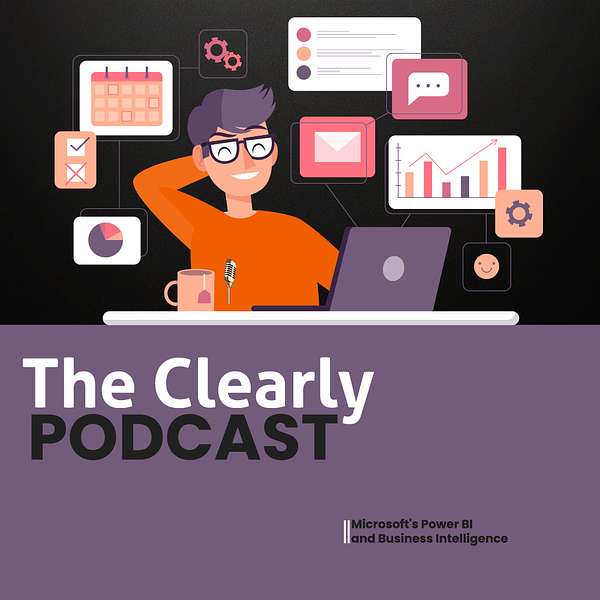
The Clearly Podcast
The Clearly Podcast
Power Platform: Is Excel Now Dead?
Use Left/Right to seek, Home/End to jump to start or end. Hold shift to jump forward or backward.
The podcast discusses whether Power Platform means Excel is obsolete. The conversation highlights that while Excel is frequently used for data storage, quick calculations, project plans, and Gantt charts, it often creates issues due to its lack of control over input, permissions, and versions. Building proper applications requires skilled coding, but Power Platform, especially Power Apps, allows for easy application development with better data management and integration with Power BI and Power Automate.
The argument for Excel emphasizes its versatility and familiarity, making it hard to replace for quick tasks and simple project management. However, Power Platform offers structured data management, user interaction, and enhanced security, making it a better solution for long-term and shared applications. The misuse of Excel as a database or business application is a key issue, and organizations need to educate themselves on the benefits of Power Platform. The discussion concludes that Excel should be used as a spreadsheet, while Power Platform should be adopted for more complex data management and application development. Future discussions will explore the implications of Power Platform on tools like SharePoint.
You can download Power BI Desktop from here.
If you already use Power BI, or are considering it, we strongly recommend you join your local Power BI user group here.
To find out more about our services and the help we can offer, contact us at one of the websites below:
UK and Europe: https://www.clearlycloudy.co.uk/
North America: https://clearlysolutions.net/
Tom: Today we are talking about Power Platform—is Excel now dead?
Andy: Wow. Anybody who's clicked on this podcast will know because they see the title.
Tom: Assuming they read the title. I mean, if it just comes up in your list of things on Spotify or whatever.
Andy: Yeah, fair point. So, we're going to talk about whether Excel is dead due to Power Platform. I'm loving this because there are good arguments for and against. I'll preside over this discussion. Tom will argue against Excel, and Shailan will defend it.
Tom: The thing we see a lot with Excel is it's frequently used to store data, input, and update data that then gets consumed into other applications like Power BI. Excel is easy to set up, but it creates a Wild West of data with no real control over input, permissions, or versions. This causes issues like failed imports if someone leaves a spreadsheet open. Building proper applications to manage data requires skilled coding, but Power Platform, especially Power Apps, allows anyone to build applications easily. It provides structured data storage, user interaction, and integrates well with Power BI and Power Automate. This makes it a better option for many tasks traditionally done in Excel.
Andy: I agree. We've shifted from Power BI to more Power Apps work because of the limitations we've seen in using Excel as a business application and database.
Shailan: Your Honor, there's a reason it's called Excel—it excels at everything it does. It's used as a structured and unstructured database, for quick calculations, project plans, and even Gantt charts. People are comfortable with Excel and it's very versatile.
Andy: I can see Tom grimacing. What do you think, Tom?
Tom: Excel is often misused as a database and business application. Power Platform offers a better solution with structured data management and application logic. It allows for more control and security, which Excel lacks. SharePoint lists can be a middle ground but have their limitations too.
Shailan: It takes time for people to move away from Excel because it's familiar. Project managers often prefer Excel over more specialized tools like Microsoft Project. Excel's ease of use and flexibility make it hard to replace.
Andy: It's not just about ease of use but also about control and proper data management. Power Platform offers that.
Tom: Excel should be used as a spreadsheet, not as a substitute for a database. When you need to share data widely or create long-term solutions, you should consider Power Platform. It provides better tools for structured data and business logic.
Andy: What do you use Excel for, Tom?
Tom: Mostly for initial data exploration and quick calculations. But for long-term or shared solutions, I move to Power BI and Power Platform.
Shailan: We use Excel for financial analysis, timesheets, and data export because it's easy to share. But for structured data and app development, Power Platform is better.
Tom: Exporting to Excel is often a workaround for poor integration. More organizations should adopt better integration methods like exporting to JSON or XML to fill these gaps.
Andy: Simple data migrations are also easier with Excel, but for more complex needs, Power Platform is more suitable.
Shailan: Excel is often used because it's easy and familiar. Organizations need to educate themselves on the benefits of Power Platform.
Tom: The misuse of Excel needs to end. Excel should be used as a spreadsheet and nothing more. Power Platform offers better solutions for data management and application development.
Andy: Agreed. Next week, let's discuss the tipping point for moving from Excel to Power Platform.
Tom: That sounds good. We can also consider what Power Platform means for SharePoint in the future.
Andy: Thanks, everyone. It's been a great discussion.
Tom and Shailan: Thank you and goodnight!